Imagine a guest just left a scathing comment about your restaurant on Instagram. Do you reply? How quickly? Do you reply publicly or privately? Social media is your front-line customer service channel. Therefore, how you respond to feedback directly impacts your restaurant’s success. For this reason, it’s time to take control of your online reputation! Turn negative interactions into positive ones and transform your online presence. Here are five strategies to master social media customer service and generate significant growth.
What is Social Media Customer Service for Restaurants?
Firstly, social media customer service is simply extending your restaurant’s excellent in-person hospitality online. It’s also about connecting with your guests on Facebook, Instagram, and review sites. It’s responding to their comments, questions, direct messages (DMs), and reviews. Think of it as your virtual front-of-house team that works to create positive experiences to build long-term loyalty. This means more than just posting menus and specials. It’s about engaging with your guests and addressing concerns in a timely and effective manner.
See how a simple reply to this Facebook comment got a repeat customer for Lomeli’s:
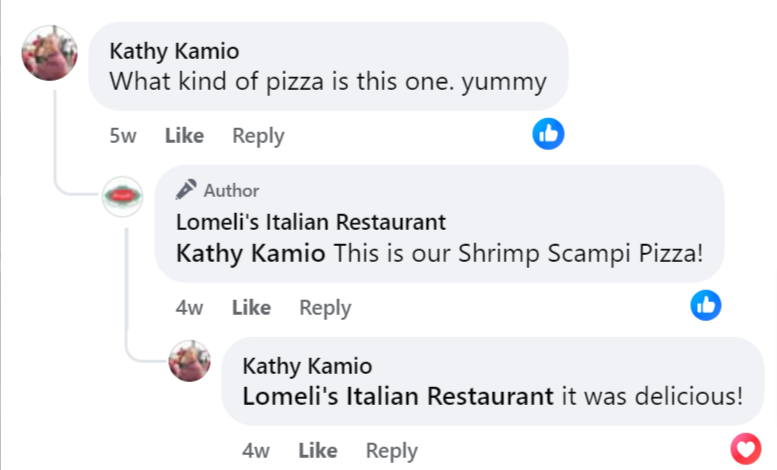
Connecting with guests online offers convenience and strengthens relationships. In today’s competitive restaurant industry, social media customer service is vital. It can determine your success. Let’s now explore why this is so vital for growth and profitability.
Why Social Media Customer Service Matters for Restaurants
Social media is your restaurant’s new front door – and how you answer the door makes all the difference. Guests expect quick, helpful online interactions, just like in person. Studies show that 76% of customers value restaurants that prioritize service. Also, 70% expect a personal response (Source: Sprout Social). For restaurants, this makes having excellent online communication crucial for success. And in today’s competitive restaurant landscape, a strong online presence isn’t a luxury—it’s a necessity.
But the restaurant business is super competitive, right? So doing a great job online gives you a big advantage. Here’s why:
8 Great Reasons to Rock at Social Media Customer Service:
- Builds a Strong Brand Image: Shows the world that you care about your customers and do things the right way.
- Generates Organic Word-of-Mouth: Happy guests spread the word, attracting new customers.
- Mitigates Negative Experiences: Quickly address concerns before they turn into bad reviews.
- Improves Your Restaurant’s Local SEO: Good online interactions improve your search engine rankings.
- Increases Customer Loyalty & Repeat Business: Happy customers return more often and tip better.
- Provides a Competitive Advantage: Great online service makes your restaurant stand out.
- Provides Valuable Customer Feedback: Learn what customers love and areas that need improvement.
- Turns Followers into Fans: Quick, helpful replies turn casual browsers into loyal customers that spend more.
In short, great online customer service means happier customers, more money, and a more successful restaurant. It’s that simple. While public responses are sometimes necessary, there are times when a private message is more effective. Let’s explore when to use private vs. public replies.
Respond Privately Before Going Public on Social Media
When guests contact your restaurant on social media, they might expect a public reply. However, in some cases, a private message is often a better first step. This is especially true for sensitive topics or negative reviews. This shows respect for the guest’s privacy and allows for a more personal conversation. It’s also less likely that the guest will take any offense to what you say since there is no public watching.
For example, look at how Lomeli’s handled this situation. They initially responded privately to a negative review, then followed up publicly:
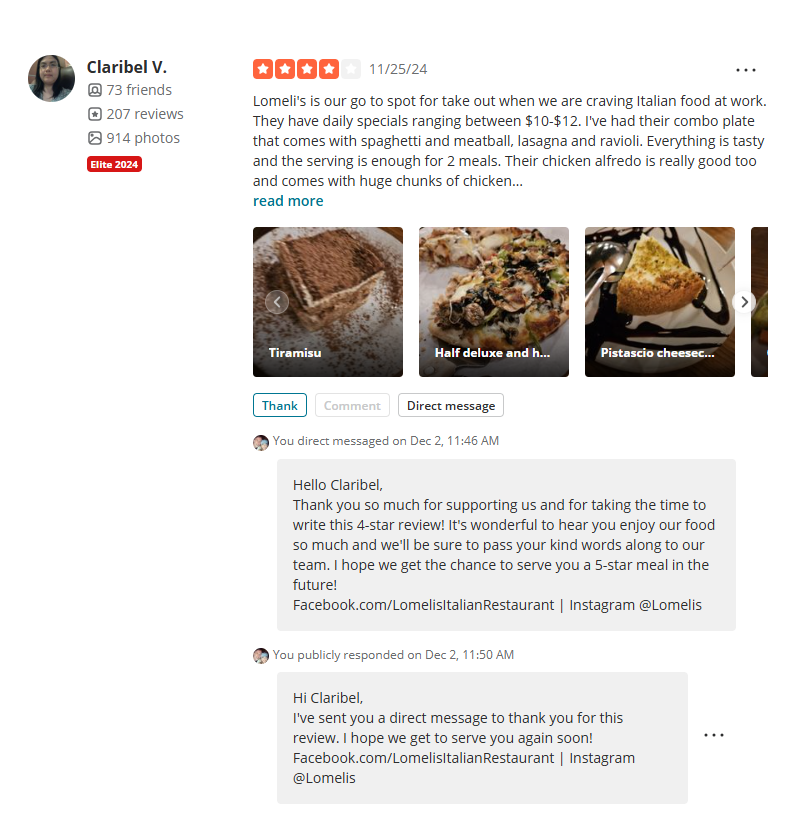
Notice how the public response shows the customer that the issue is being addressed. It acknowledges the private message without sharing details.
Sometimes, a quick private message is enough. This is especially true for more trivial situations like answering a simple question or addressing a minor concern. Here’s a positive outcome from a purely private response:
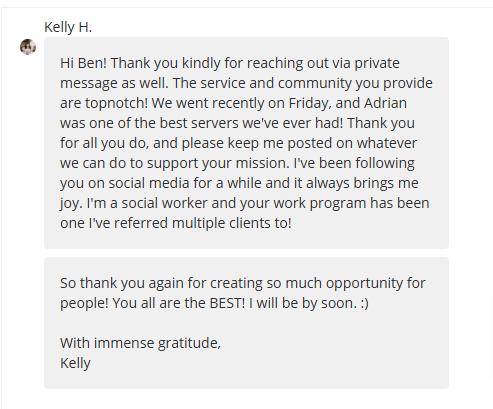
Handling issues privately often leads to better results for both the guest and the restaurant. It reduces the risk of bad publicity and allows for a more controlled problem-solving environment. After addressing the issue privately, consider a short, public reply. For example, “We’ve sent you a private message.” Or, “We appreciate your feedback and have already contacted you privately to address your concern.” This shows that you’re responsive and proactive.
Handling sensitive issues privately is crucial. However, it’s equally important to demonstrate empathy in your responses, both private and public.
Show Empathy in Your Social Media Responses
Why Empathy Matters
When guests leave reviews or contact your restaurant online, they always want to feel heard and understood, not just get a quick solution. This basic human need is often overlooked in online customer service. Yet addressing it is key to providing excellent service and building loyal customers. If people don’t feel heard, they might keep arguing. They may become more upset about not being understood, even if their problem is solved.
What Empathy Looks Like
Genuine empathy is the solution. It means seeing things from your guest’s perspective, and considering their feelings and worldview. Showing empathy helps people feel understood, calming the situation and making it easier to find a solution. Understanding the customer also helps you respond better and find a better solution.
Turning Negative Experiences Into Positive
Empathy can transform negative online experiences into positive ones. A truly empathetic response can boost your online reviews and your restaurant’s reputation. Imagine turning a 2-star review into a 4-star review simply by showing you care! But, generic phrases like “thank you for your concern” or “your feedback is important to us” often fall flat. They can sound insincere and even make things worse.
The Importance of Thoughtful Responses
Responding with empathy requires more than a simple acknowledgment. It requires careful consideration and understanding people’s feelings. This can be challenging, especially when faced with trivial or personal attacks. It doesn’t feel good to pour your heart and soul into your business only to face harsh criticism. However, responding with empathy is crucial for success. Either you or a dedicated team member will need to take the time and energy to respond thoughtfully. The result is worth the effort: happier customers, a better reputation, and more money. Start practicing empathy in your online responses today, and see the positive impact on your customers and your restaurant’s success.
Showing empathy is critical for building strong customer relationships. However, remember that your writing style also plays a crucial role in creating authentic and effective communication.
Respond Like You’re Talking to a Guest In Person
Let’s face it: Responding to online reviews can feel impersonal. But those comments are from real people who’ve experienced your restaurant firsthand. Whether it’s a five-star rave or a one-star complaint, there’s a person with feelings behind it. Would you ignore a guest sharing their thoughts in person? Of course not!
Many restaurant owners treat online comments as faceless attacks. Some even claim that all bad reviews are from competitors or disgruntled staff. While possible, it’s rarely the case. Don’t let this mindset prevent you from connecting with your guests.
So, how do you respond authentically? Simple: Respond like you would if they were standing right in front of you.
- Positive Reviews: Imagine a guest telling you how amazing their meal was. What would you say? You’d express your gratitude, maybe mention the chef, and thank them for choosing your restaurant. Do the same online! Don’t give a generic “Thank you!” Personalize it!
- Negative Reviews: Now imagine a guest expressing their dissatisfaction. You wouldn’t ignore them, nor would you be sarcastic or dismissive, right? You’d listen, apologize, and offer a solution. Do the same online. Empathy and a sincere desire to make things right go a long way in turning a negative experience around.
Avoid robotic, impersonal responses because they’re a major turn-off. Let your personality shine through! Use the same friendly, conversational language you’d use with friends and family. This is your opportunity to turn casual browsers into loyal fans.
Here’s what to do:
- Respond to everyone: Don’t play favorites! Every review and comment matters, whether good or bad.
- Remember the human element: There are real people with feelings behind every message.
- Respond as you would in person: Write authentically and genuinely.
By following these steps, you’ll build better relationships with your customers. You’ll turn unhappy customers into happy ones. In the end, you’ll boost repeat business, tips, and referrals. And let’s be honest, that means more money for your restaurant.
Authentic communication is key. Equally important is responding promptly. Let’s explore the importance of speed and consistency.
Stay Active, Respond Quickly: Why Speed Matters (and How to Make It Happen)
Guests expect fast responses. In fact, over 80% of people expect a reply on social media within 24 hours. (Source: Sprout Social). In the fast-paced restaurant world, quick replies to online reviews are vital for success. Customers expect answers promptly, often within 24 hours for social media comments and 48 hours for reviews. A slow response can mean losing a customer to a competitor who’s more responsive. That lost customer translates directly to lost revenue.
The challenge? Restaurant owners are busy! Finding the time to consistently check and respond to comments and reviews can feel overwhelming. Imagine managing reservations, kitchen issues, and customer requests. Now add constant notifications about Facebook friend requests, irrelevant posts, and ads. It’s overwhelming! Notifications can cause fatigue, and without a system in place, consistency suffers.
Prioritizing Your Responses
When faced with a flurry of messages, focus on urgent matters first:
- Urgent Responses (within 24 hours): Address complaints, negative reviews, and other urgent inquiries within 24 hours. A swift response shows you care and can de-escalate tense situations. Sometimes, waiting a day to respond to a negative review helps. It cools both you and the customer down, which can lead to a more productive, less emotional reply.
- Within 48 Hours: Respond to customer reviews (e.g., Google, Yelp, and TripAdvisor reviews) within 48 hours. Timely responses demonstrate that you care about your reputation and value customer feedback.
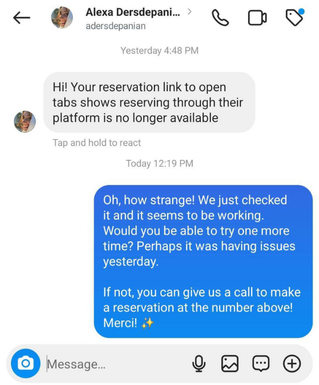
Staying Consistent: The Key to Success
Consistently monitoring and responding to online interactions is key. Maintaining this level of engagement consistently over time can be hard for many restaurant owners. It’s usually because of time constraints, a lack of expertise, or a lack of organization. Without a dedicated system or support, staying on top of things becomes difficult.
While Facebook and Instagram notifications can help, they often lead to notification overload. The constant stream of alerts can make it difficult to know what’s actually important. and some messages might get overlooked. The key here is to make sure your notification settings are set so that you’re only notified when it matters.
Creating a System That Works
If you struggle to monitor and respond promptly, it’s time to implement a system. This could mean delegating the task to a staff member. You could also explore solutions to free up your time to focus on creating exceptional dining experiences. A dedicated person or team handling this ensures timely, consistent responses. The benefits of consistent, active engagement far outweigh the effort involved. Don’t let slow response times cost you customers and revenue. Develop a system that works for you today.
Remember: Quick, thoughtful replies build customer loyalty. They turn casual browsers into repeat customers and brand advocates.
Timely responses are crucial. However, truly exceptional customer service extends beyond prompt replies. It also involves actively listening to your customers and using their feedback to improve your business. Let’s explore how to be truly proactive.
Listen Up! Using Social Media for Proactive Improvements
Social media isn’t just for responding to direct comments. It’s a powerful tool for actively listening to your customers and making proactive improvements. It’s about reading between the lines and spotting trends. You can then use that info to improve your restaurant and guest experience. This goes beyond simply replying to comments; it’s about actively seeking out feedback and using it to improve.
Beyond Direct Feedback
Sometimes, the best insights come from indirect feedback. This includes guest conversations, mentions in unrelated posts, and Instagram location tags. For example, two guests are chatting in your Instagram comments. They are complaining about the overpowering scent of the restroom’s cleaning products, near their table. A savvy restaurant owner would see this as an opportunity. Maybe you rearrange tables, change cleaning times, or switch to a less pungent cleaner. Then, they would reply to those guests directly, thanking them for their feedback. That way, they would know you’ve made adjustments based on their comments. This shows your customers that you are listening and validates their concerns.
What to Track (Without Fancy Tools)
For independent restaurants, investing in expensive social listening tools might not be necessary. Here’s how to stay informed:
- Monitor Mentions: Actively track mentions of your brand on Facebook and Instagram. Configure your notifications. That way you’re alerted whenever someone tags your restaurant’s social media profiles.
- Track Location Tags (Instagram): Keep an eye on Instagram posts that tag your restaurant’s location. This provides valuable visual insights into customer experiences. The photos and videos people post are a goldmine of feedback!
- Check Reviews: Review platforms like Google, Yelp, and TripAdvisor often have notification settings. Use them!
Here’s an example of proactive engagement. 818Brewing responded to this inquiry about upcoming events. Not only did they answer the customer’s question, but they also generated more interest in their events.
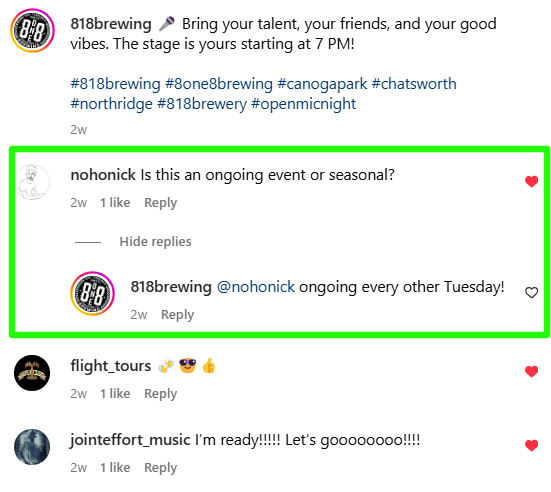
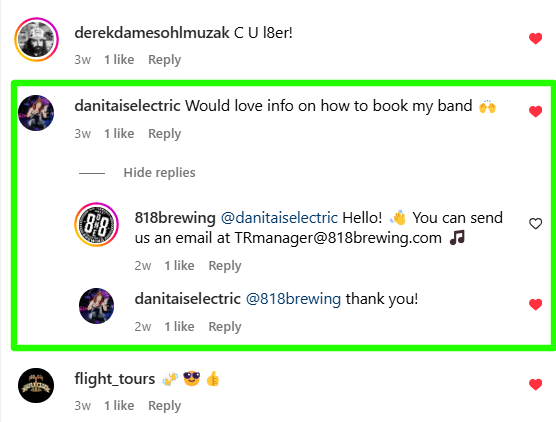
By consistently monitoring these areas, you’ll gain valuable customer insights without needing expensive social listening tools.
Turning Insights into Action: A Proactive Approach
Once you identify trends or recurring issues in your online feedback, take action. The examples below illustrate how you can use customer insights to improve your restaurant:
- Improve Menu Items: If guests often mention dry chicken in a dish, fix it! Adjust the recipe or cooking methods. Or, add a note to the menu about the dish’s texture.
- Expand Offerings: If you see comments that guests wish there were more vegan or gluten-free options, create new menu items to meet these needs.
- Adjust Operations: If slow service during peak hours is a recurring theme, adjust your staffing levels.
- Wait Times: If guests mention long wait times, work to improve it. Optimize the reservation system. Adjust staffing during peak hours. Or, consider a waitlist with text notifications.
- Staff Training: If multiple reviews mention rude or inattentive staff, train them. Consider implementing extra staff training programs focused on customer service and communication skills.
- Improve Cleanliness: If guests often complain about the sticky floor, make sure it gets cleaned more often!
- Adjust Noise Levels: If guests complain about it being too loud, turn the music down, or add sound-dampening materials.
- Expand Payment Options: If guests prefer to use mobile pay, figure out how to offer it.
Leveraging Positive Feedback:
Just as crucial as addressing negative feedback is celebrating and preserving what your guests love. Consistent positive mentions highlight aspects of your restaurant that are working exceptionally well. Don’t change those things! Instead, pay close attention and take steps to ensure they remain consistent. For instance:
- Reward Exceptional Staff: If a particular server consistently receives praise, reward them for their outstanding work. You could go a step further to analyze what they do that makes them so good and then train other staff members to do the same. You could even start screening for these qualities in your hiring process.
- Highlight Popular Menu Items: Identify consistently praised dishes and highlight them in your marketing materials. If everyone loves your kids’ menu, promote it to families with young kids.
- Unique Aspects: If guests rave about a specific ambiance detail (e.g., live music, decor), make sure that element stays a consistent part of the dining experience.
Use positive feedback to reinforce what your customers love. This fosters loyalty and repeat business. By listening attentively, you can gather valuable insights. However, remember to always follow up on these insights by demonstrating your responsiveness and appreciation for the feedback.
The Power of Reporting Back
After making improvements, thank the guests who shared their thoughts. Let them know you’ve made changes based on their input. This creates a sense of community and strengthens customer loyalty.
The Big Takeaway
By listening, adapting, and reporting back to your customers, you can improve your restaurant a lot. It will also build really strong customer loyalty. Additionally, it results in happier customers, improved operations, and ultimately, increased revenue. Everybody wins! Start actively listening to your customers today. You’ll be surprised at the insights you gain and how much you can improve your restaurant!
In conclusion, don’t let the complexities of social media management hold back your restaurant’s growth. Take control of your online reputation and build stronger customer relationships by implementing these strategies today. Start small, focus on consistency, and watch your restaurant thrive.
Did you know?
We've been managing social media accounts for restaurants since 2012. For almost a decade, we've partnered with restauranteurs who are serious about using social media to generate business. Whether you're a good fit for our service or not, let's schedule a call and we'll give you free personalized advice on how to improve your social media presence. Either way, you'll walk away from the call more confident about your ability to promote yourself online - completely for free.
